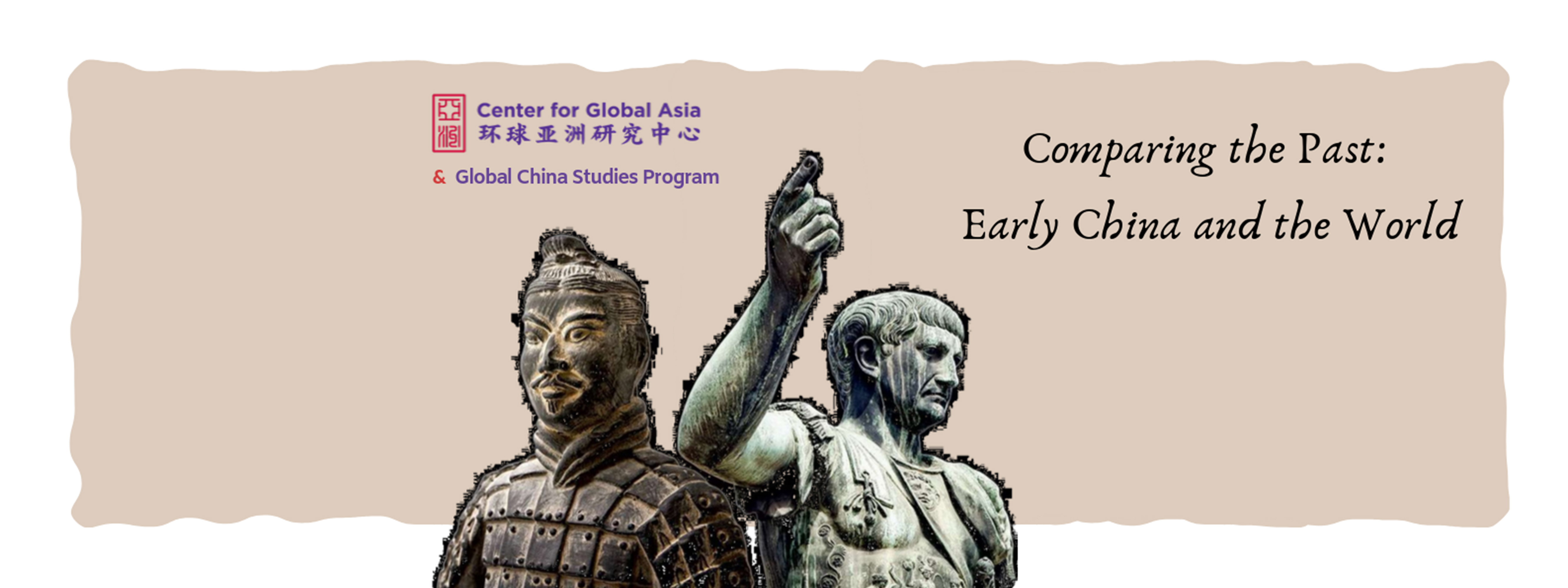CONTACT US
Email: shanghai.cga@nyu.edu
Phone Number: +86 (21) 20595043
WeChat: NYUShanghaiCGA
Address:
Room W822, 567 West Yangsi Road,
Pudong New Area, Shanghai, China

© 2024 All Rights Reserved

Venue: Room 1505, 1555 Century Avenue, NYU Shanghai
Date: Wednesday, October 16, 2019
Time: 17:30 - 19:00 CST
When we speak of “Early China,” what exactly are we talking about? When most people think about China in the long ago past, what do they think of? The likely answer is the great philosophers, like Confucius and Mencius; the famous strategist, Sunzi. Perhaps we think of terra cotta warriors in Xi’an, or perhaps the philosopher, Zhuangzi, dreaming of being a butterfly. These famous markers of “Early China” are only pieces of a larger, less familiar story. Early China was also a time of practices like human sacrifice and oracle bone divination, of zeal for Heaven’s mandate and utopian visions such as the Great Unity. Generations of scholars have contributed to understanding this period that can seem so alien to us, and presented it to a world audience. Now Early China is not only an integrated part of the global past, often compared with Ancient Greece and the Roman empire, enrollment in Harvard’s class on Early Chinese thought has reached 700 students. What is the appeal of Early China, and how do we study it? This event invites the leading scholars of this field to talk about their own experiences in the field of Early China and how to present this vibrant scholarly field to a global audience.
Michael Nylan (Ph.D. 1983, East Asian Studies, Princeton University) is Professor in the Department of History at the University of California, Berkeley. She began her teaching career at Bryn Mawr College, in its History Department, with a joint affiliation with the Growth and Structure of Cities program and with Political Science. There she began to learn about early political philosophy by co-teaching with Steven Salkever, an Aristotle expert. After having served as a one-woman show in East Asian History for over a decade at Bryn Mawr, in 2001 she moved on to join the UC-Berkeley History Department, to conduct research with some of the country’s best scholars of Chinese history and to supervise graduate students from around the world. Now she writes in three main academic disciplines: the history of early China (roughly 300 BC-AD 300), early Chinese philosophy, and the art and archaeology of China. As her teachers (Paul Serruys, Michael Loewe, Nathan Sivin, Herbert Fingarette, and Henry Rosemont, Jr. among them) gave her an abiding interest in the use and abuse of history, she also works in the modern period, as well as in the politics of the common good, past and present. She has won prizes for her translation and research endeavors. Currently she is completing two projects, a reconstruction of the Han-era Documents classic (jointly with Professor He Ruyue), and a project tentatively entitled The Four Fathers of History (jointly with Professor Suzanne Saïd), which compares Herodotus, Thucydides, Sima Qian, and Ban Gu.
Michael Puett is the Walter C. Klein Professor of Chinese History at Harvard University. His interests are focused on the inter-relations between history, philosophy, anthropology, and religion, with the hope of bringing the study of China into larger historical and comparative frameworks. He is the author of The Ambivalence of Creation: Debates Concerning Innovation and Artifice in Early China (Stanford University Press, 2001) and To Become a God: Cosmology, Sacrifice, and Self-Divinization in Early China (Harvard University Asia Center, 2002), as well as the co-author, with Adam Seligman, Robert Weller, and Bennett Simon, of Ritual and its Consequences: An Essay on the Limits of Sincerity (Oxford University Press, 2008).
Trenton Wilson, Ph.D. Candidate in the Department of History at the University of California, Berkeley. Trenton is interested in early Chinese intellectual and political history, especially during the Qin, Han and Wei-Jin periods. He is currently working on a dissertation entitled, “Empire of Luck: Trust and Suspicion in China’s Early Empires, 221 BCE-317 CE.” Prior to his studies at UC Berkeley, Trenton received an M.A. in Chinese philosophy at Beijing University.
Introduction and moderation of the Q&A by Zhao Lu, Assistant Professor of Global China Studies, NYU Shanghai.
This event is cosponsored by the Center for Global Asia and the Global China Studies Program, NYU Shanghai.
To our visitors:
• RSVP may be required for this event. Please check event details
• Visitors will need to present a photo ID at the entrance
• There is no public parking on campus
• Entrance only through the South Lobby (1555 Century Avenue)
• Taxi card
• Metro: Century Avenue Station, Metro Lines 2/4/6/9 Exit 6 in location B
• Bus: Century Avenue at Pudian Road, Bus Lines 169/987
Email: shanghai.cga@nyu.edu
Phone Number: +86 (21) 20595043
WeChat: NYUShanghaiCGA
Address:
Room W822, 567 West Yangsi Road,
Pudong New Area, Shanghai, China

© 2024 All Rights Reserved